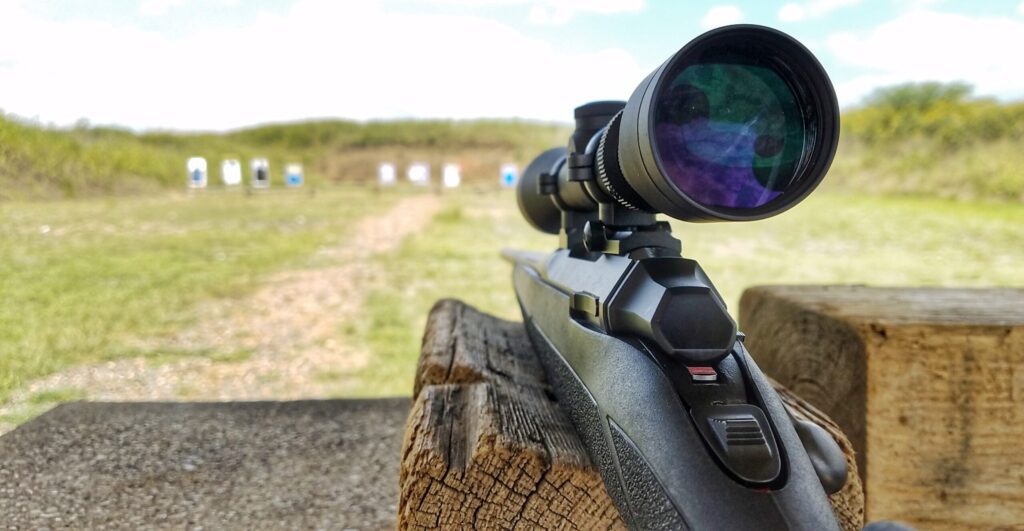4-H Shooting Clubs Help Keep Life Goals On Target
by TIM CRAIG
For Diane Sharp and Melissa Stockenberg, the 4-H shooting clubs in Central Florida started out as an activity for their children, but it turned into a family affair.
“Growing up, I always thought that 4-H was just about raising cattle and those types of activities,” says Stockenberg, who got involved in the Highlands County 4-H shooting Club through her daughters. “But it is so much more.”
The shooting clubs give participants skills that translate to all areas of life, says Sharp.
“They learn patience, concentration and goal-setting skills; they learn to compensate and adjust on the fly when things aren’t going exactly right,” says Sharp. “But the cool thing is that they don’t have to be the most physically fit individual in order to compete and succeed. They can just be themselves and do well, and that boosts confidence.”
The national 4-H Shooting Sports programs started in 1980. Since that time, more than 3.5 million youth and adults have been involved in the program, according to the National 4-H Shooting Sports office. In 2020, there were 500,000 youths and 20,000 adult volunteers in 47 of the 50 states in the 4-H shooting sports programs.
“The 4-H shooting clubs aren’t a parent dropoff kind of activity. We want the parents to be on-site while their children are learning,” says Sharp, who has been a 4-H leader for 11 years and has had three children go through the program. “So when my kids got into it, I figured that if they’re going to do it, I’m going to, as well.”
Shooting was an easy activity to get into for Sharp, who grew up around guns and works as a staff assistant in the Florida Wildlife Division of Hunting and Game Management. But she soon took her interest to the next level. She became a certified instructor for archery, shotgun and rifle and Level 2-certified in Black Powder and Smallbore Rifle. Level 2 certification allows Sharp the ability to teach the Level I certification courses throughout the state.
For Stockenberg, a lifelong resident of Highlands County, it was a 4-H open house that opened the door for her and two daughters to the shooting club.
“Growing up, I wasn’t involved in 4-H, but when we found the open house and learned about the archery program, it was something, we were immediately interested in,” she says. “We have loved it so much that now my oldest daughter is certified in archery.”
Stockenberg also became a Level 1 instructor in Archery. Her husband, who is also involved in the Highlands County program, is certified in archery and shotgun.
The impact that the shooting sports program had on their daughters has been evident as they have grown.
“4-H helps with leadership and confidence,” says Stockenberg. “Both of my girls were quiet and shy, but now when they get in a big group, they have the confidence to thrive in that group.”
“The friendships you develop with other 4-H families all over the state is what makes this special,” says Stockenberg. “4-H friends stick around more, I think, than other friends. They compete hard against each other, but they also build each other up and cheer each other on and that makes a lifelong impact.”
For people who think it’s a dangerous idea to let young people use weapons, both women adamantly say the opposite is true. Not teaching young people about guns, they say, can leave them unaware of the dangers.
“If you take curiosity out of the equation, they’re likely to not touch a gun when they see it,” says Sharp. “I would rather have a child fully versed in gun safety and protocol in the event they go to a friend’s house and someone gets curious. They would know how to de-escalate that situation.”
For Stockenberg, that’s the exact reason to teach young people gun safety and gun handling. “Guns are very prominent in this part of Florida and for me, it’s better to teach gun safety — even for kids who have been around guns their whole lives — because you can’t control what happens when your kids go to other places, but you can teach them what to do in that situation.”
Beyond the safety and the life skills, the key experience becomes the relationships the participants develop as they go through the program. For Sharp, it came into focus when her son was a senior.
“I was watching him compete and saw him with three or four kids from different counties,” she says. “Seeing the bond they had, it was just amazing. Every time they came together they were very competitive, but they also respected each other and that’s what can happen when you shoot with someone over a period of time.”

